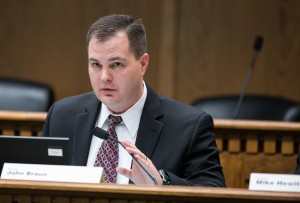The Senate Trade and Economic Development Committee voted Wednesday in favor of adding eight bills to the already robust jobs package spearheaded by the Senate Majority Coalition Caucus. Sen. John Braun, committee chairman, said each bill passed would help to bring stability, predictability and efficiency to Washington’s private sector. It will also help small-business owners by encouraging them to spend money on hiring new employees, increase benefits for existing workers, or invest in capital-improvement projects.
“Our committee is dedicated to passing bills that will improve the conditions for employers looking to manufacture products in Washington,” said Braun, R-Centralia. “Long gone are the days of competing with other states. We have to make sure our local manufacturers can compete in a global market, which includes China and India.”
Since the 2013 legislative session began less than six weeks ago Braun and his fellow Majority Coalition Caucus members have put together a comprehensive collection of proposed legislation designed to help stimulate Washington’s economy and create private-sector jobs. So far the caucus has voted more than 20 pro-jobs bills out of several committees, and will add several more bills ahead of legislative deadlines for committee votes on bills.
“Our caucus has focused our efforts on jobs, education and a sustainable budget. The eight bills moving to the Rules Committee as a result of Wednesday’s votes are in line with our emphasis on encouraging job creation,” Braun said. “Too many people in our state are unemployed or underemployed. These proposals strike at the core issues making it difficult for our families, friends and neighbors to find work. Make it easier for the private sector to grow our economy, which will result in the private sector growing our economy. It is really that simple.”
Here is a summary of the eight bills moving out of the Trade and Economic Committee, some go to the Rules Committe, which selects legislation for votes by the full Senate, and others go to the Senate Ways and Means Committee because of potential financial impacts. Braun introduced or is co-sponsoring each measure, several of which have attracted bipartisan sponsorship.
- Senate Bill 5647 would require the state Department of Revenue to publish all determinations within 90 days of finalization to the general public. Braun said this will allow for a more open government, and provide clarity for taxpayers who are trying to figure out the state’s complex tax code. The bill would allow businesses to research similar determinations prior to filing appeals, or trying to determine their effective tax rates.
- Senate Bill 5656 would require each town or city that imposes business and occupation taxes to enable their general business licenses to be issued and renewed through a state business licensing system by July 1, 2016. Braun said setting up one central website for all such licenses in the state would resolve the ongoing inefficiency of businesses having to visit multiple websites and city halls to renew state and city business licenses.
- Senate Bill 5679 would require the departments of Ecology, Health, and Labor and Industries to perform yearly formal reviews of their rules. The goal, Braun explained, is to reduce the regulatory burden on businesses and improve the processes for licensing, permitting, and inspection without compromising public health and safety.
- Senate Bill 5680 would remove two state agencies and add 13 others to the list of organizations that must fully participate in the state’s Business Licensing Service. The bill defines “fully participating” as providing the Department of Revenue with the information necessary to apply for every business license issued by an agency.
- Senate Bill 5688 would create uniformity between state and local business and occupation (B&O) taxes for employers. It would create a uniform tax-classification system, and require cities to change their B&O tax categories to match the state’s system, making it easier for employers to determine their appropriate tax rates. Currently, Braun noted, businesses may have to report under several different tax classifications.
- Senate Bill 5697 would restrict the frequency with which DOR can change local sales and use taxes. The bill would create a 75-day waiting period after receiving notice of a change, and changes would only be allowed to occur on the first day of April or October.
- Senate Bill 5718 would grant the Legislature the ability to monitor progress toward developing the one-stop business portal requested by Executive Order 12-01. The Office of the Chief Information Officer (OCIO), in collaboration with several state agencies, would have until November to provide the Legislature with a plan for establishing performance benchmarks for implementing the portal.
- Senate Bill 5765 involves a business regulatory-efficiency program administered by the Department of Commerce. The Legislature would create a pilot program focusing on the manufacturing sector, with the goal of providing a friendlier regulatory environment. The commerce department, the state Office of Regulatory Assistance, and the Office of Accountability and Performance would have to conduct multijurisdictional regulatory streamlining projects within a particular geographic location every year.









